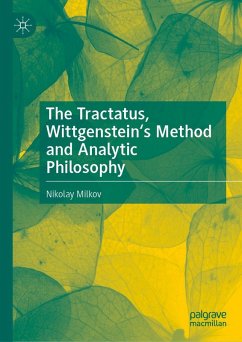
Bertrand Russell and the Global Reception of Analytic Philosophy
Versandkostenfrei!
Versandfertig in 6-10 Tagen
106,99 €
inkl. MwSt.

PAYBACK Punkte
53 °P sammeln!
This book provides the first exploration of a new field of study, that of the global reception of analytic philosophy. Its aim is to understand how Russell's program of logical analysis of philosophy was received, interpreted and transformed during the interwar period in different geographical and cultural areas. Russell s idea was that the new mathematical logic could provide definitive solutions to traditional philosophical problems. But which problems and from which traditions?Based on three case studies (the works of Norbert Wiener, Jean Nicod and Feng Youlan), this book shows how Russelli...
This book provides the first exploration of a new field of study, that of the global reception of analytic philosophy. Its aim is to understand how Russell's program of logical analysis of philosophy was received, interpreted and transformed during the interwar period in different geographical and cultural areas. Russell s idea was that the new mathematical logic could provide definitive solutions to traditional philosophical problems. But which problems and from which traditions?
Based on three case studies (the works of Norbert Wiener, Jean Nicod and Feng Youlan), this book shows how Russellian logical analysis becomes transformed through contact with three philosophical configurations (pragmatism in the US, Bergsonism in France and new Confucianism in China).
The book describes in detail the changes introduced into Russellian logical analysis by authors who applied it to philosophical problems and traditions that Russell was unfamiliar with. The logical method is seen to adjust to the culturally determined material it encounters. That there is this adjustment raises the delicate and intriguing question of whether logical analysis (and/or logic) depends on variable cultural traits. This issue is addressed in the book's general conclusion.
Bertrand Russell and the Global Reception of Analytic Philosophy is essential reading for all scholars, researchers and advanced students of the history of analytic philosophy and especially the reception of analytic philosophy in different countries and cultures.
Based on three case studies (the works of Norbert Wiener, Jean Nicod and Feng Youlan), this book shows how Russellian logical analysis becomes transformed through contact with three philosophical configurations (pragmatism in the US, Bergsonism in France and new Confucianism in China).
The book describes in detail the changes introduced into Russellian logical analysis by authors who applied it to philosophical problems and traditions that Russell was unfamiliar with. The logical method is seen to adjust to the culturally determined material it encounters. That there is this adjustment raises the delicate and intriguing question of whether logical analysis (and/or logic) depends on variable cultural traits. This issue is addressed in the book's general conclusion.
Bertrand Russell and the Global Reception of Analytic Philosophy is essential reading for all scholars, researchers and advanced students of the history of analytic philosophy and especially the reception of analytic philosophy in different countries and cultures.












